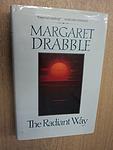Margaret Drabble
Margaret Drabble is a distinguished English novelist, biographer, and critic. Born on June 5, 1939, in Sheffield, England, she has published numerous novels that often explore themes of female identity, relationships, and social change. Drabble's work is known for its insightful portrayal of contemporary life and its psychological depth. Some of her notable works include 'The Millstone', 'The Witch of Exmoor', and 'The Radiant Way'. She was awarded the title of Dame Commander of the Order of the British Empire for her contributions to literature.
Books
This list of books are ONLY the books that have been ranked on the lists that are aggregated on this site. This is not a comprehensive list of all books by this author.
-
1. The Radiant Way
"The Radiant Way" is a novel that follows the lives of three women, Liz, Alix, and Esther, who meet at Cambridge in the 1950s and remain friends over the next three decades. The book explores their personal and professional lives, their relationships, and the social and political changes that take place in Britain during this time. It offers a compelling depiction of the shifting roles of women and the changing landscape of British society in the second half of the 20th century.
-
2. The Millstone
This novel explores the life of a young, single, and intellectual woman living in London during the 1960s, who finds herself unexpectedly pregnant after a one-night stand. As she decides to keep the baby, she faces the challenges of motherhood alone, in an era when single parenthood was stigmatized. The narrative delves into her journey of self-discovery, resilience, and the transformation of her values and lifestyle. Through her experiences, the book offers a poignant commentary on societal expectations, the complexities of personal freedom, and the profound impact of motherhood on a woman's identity.
-
3. The Gates Of Ivory
In this novel, a British writer embarks on a harrowing quest to find her friend, a playwright who has gone missing in Cambodia during the Khmer Rouge regime. The narrative weaves together the writer's journey through a landscape of political turmoil and personal discovery, with letters and fragments from the missing friend that reveal the brutal reality of the regime. As the protagonist delves deeper into the darkness that has engulfed her friend, she confronts the limits of art, the responsibilities of intellectuals, and the haunting interplay between politics and individual lives. The story is a poignant exploration of the human capacity for both cruelty and compassion, set against the backdrop of one of the 20th century's most tragic episodes.
-
4. The Needle's Eye
"The Needle's Eye" explores the complexities of wealth, morality, and personal fulfillment through the story of Rose Vassiliou, a woman who has inherited a fortune but chooses to live a modest life in opposition to the materialistic values of her upbringing. Her life becomes intertwined with Simon Camish, a struggling barrister, as they navigate their conflicting ideals and the social expectations of London in the 1970s. The novel delves into themes of social class, family dynamics, and the search for meaning, as Rose and Simon confront their pasts and question what it truly means to lead a good life.
-
5. The Ice Age
"The Ice Age" is a novel that explores the social and psychological landscape of 1970s Britain through the eyes of its protagonist, a middle-aged real estate developer. As he navigates the economic downturn and the changing social climate, his personal life becomes intertwined with those of a diverse cast of characters, including a troubled young girl and an American Vietnam war veteran. The narrative delves into themes of isolation, societal decay, and the search for meaning amidst the chaos of a world in flux, painting a vivid portrait of an era marked by uncertainty and the quest for personal and collective identity.
-
6. Jerusalem The Golden
"Jerusalem The Golden" follows the life of a young woman named Clara who is torn between her intellectual ambitions and her desire for love and companionship. Set in 1960s London, the novel delves into Clara's struggles with her family, her relationships, and her own identity as she navigates through the changing social and political landscape of the time. With its vivid portrayal of Clara's inner conflicts and the vibrant backdrop of the city, the book offers a poignant exploration of the complexities of personal and societal expectations.





